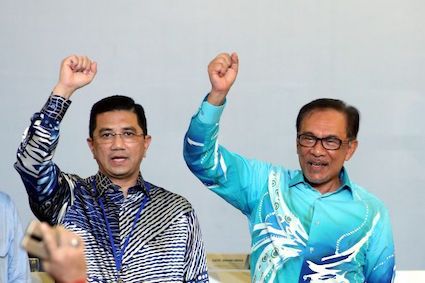Anwar? Azmin? How should we choose our next PM?

Nathaniel Tan, The Star
WHO will be Malaysia’s next Prime Minister?
This is apparently the only question that matters in Malaysian politics, as can be seen by the relentless fixation on this issue alone for weeks and months now – played out especially in the conflict between PKR president Datuk Seri Anwar Ibrahim and his deputy Datuk Seri Azmin Ali.
As PKR is indeed an Umno splinter party, I suppose it’s no surprise they’ve inherited the classic Umno president versus deputy president conflict.
The saddest thing about the conflict between Anwar and Azmin is that it has nothing whatsoever to do with ideas, ideology, principles or policies.
Nowhere in any part of this sordid, drawn-out conflict are either individual or their supporters debating different approaches towards governing Malaysia, or what values should inform how we lead this country.
Instead, the conflict has been 100% feudal – it is all about (and only about) whether you support Team A or Team B.
Nobody seems to know or care about what either Team stands for, or how either Team might differently affect the everyday lives of normal Malaysians.
It’s basically either “my guy” or “your guy” – basically, Malaysian politics at its feudal worst.
Why do our politicians behave like this? Why are these the predominant contours in Malaysian politics?
I believe the simple answer lies in the way we structure our political system.
This week Boris Johnson became Prime Minister of the United Kingdom. How many people voted democratically to make the final decision in choosing the leader of this nation of 66 million people?
The answer is 160,000.
That’s right – 160,000 members of the British Conservative party voted to decide between Johnson and rival Jeremy Hunt. Johnson won 92,153 votes to Hunt’s 46,656.
So essentially, fewer than 100,000 people were responsible for choosing the Prime Minister of 66 million people.
Does that seem right to you?
If all 66 million people were allowed to choose democratically between Johnson and Hunt, would the end result have been the same?
In Malaysia, we follow the same Westminster system. Members of a political party elect the leader of their party, and that leader leads their party into a general election.
This is why in the past, it was just as important to win the post of Umno president as it was to win the general election, if you wanted to become prime minister.
This simple fact has extremely deep national implications. You could pinpoint it as a vital, primary reason why Malaysia has such racialised politics.
If you want to ascend to the top of a race-based party, then you have to pander relentlessly to racial sentiments. When politicians at the very top of the pecking order indulge in this type of politics, it colours the entire sociopolitical fabric of a nation.
Coming back to Anwar and Azmin, this is also why neither individual feels currently obligated to spend their time focusing on national issues that affect Malaysians like you and me.
Simply put: we don’t matter.
All they need to care about to ensure their position and future is to have the support of party members and Members of Parliament.
The former is a relatively small group (just like the United Kingdom), and the latter even smaller. Most of us don’t belong to either group.
Thus, the top leaders of our country – those entrusted with literally every aspect of our lives and welfare – are completely preoccupied with internal political intrigue, endless backroom deals, and crossing and double-crossing one another.
We can blame them as individuals, but generally, individuals act in accordance with the incentive structures they find themselves in.
At present, Malaysia’s political system fully incentivises this type of behaviour.
Put in simpler terms: this is the way the game is, and this is how they feel they have to play it to win it. If the rules of the game don’t change, the behaviour of the players won’t either.
The US electoral system has its own oddities and defects – not least of which is its somewhat bizarre electoral college. Certainly it is far, far from perfect.
That said, the US system for choosing which candidate from each major party is chosen to be that party’s candidate for president does have its strengths.
As we have already started to see in the Democratic primaries (the contest in which the Democratic Party’s candidate for president is chosen) through their first rounds of debates between candidates, the system incentivises political hopefuls to make a name for themselves by being associated with certain ideas, policies and principles.
By way of a few examples, Elizabeth Warren is campaigning on a firebrand platform of smashing the grip that big corporations have on America; Bernie Sanders is a hardcore leftist with essentially socialist ideas; while Joe Biden looks to appeal to more centrist Democrats.
One candidate, Andrew Yang, seems to be campaigning almost on a single issue: the introduction of a universal income.
Thus, candidates are identified with ideas and policy positions. In some states in America, the voting in the primaries is even open to citizens who are not a member of the party holding the primary.
This seems to be very much more in accordance with genuinely democratic values.
I don’t follow American politics all that closely, but do know enough to give the summary above.
On the other hand, I’ve been following Malaysian politics for well over a decade, and I still couldn’t paint you an interesting picture differentiating Anwar and Azmin in terms of how they think about government or social policy.
It’s hard to say whether old leopards can change their spots; but for Malaysians who are still going to be around long after these leaders have retired, perhaps we should start thinking more seriously about how we can change the rules of the game, to incentivise the type of positive behaviour we ultimately want from our leaders.

